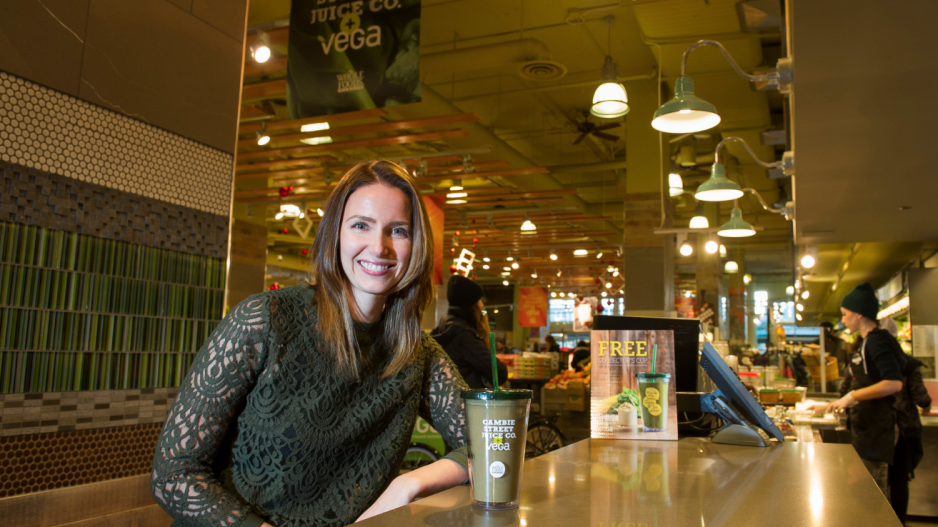When Whole Foods Market (Nasdaq:WFM) recently renovated the juice bar at its Cambie Street store, its staff did what they do as a matter of course: they involved a local business.
In an era when critics slam multinational companies for using size and purchasing power to snuff out small businesses, Whole Foods notably has built a reputation for partnering with local producers to provide customers with sustainable products while also supporting the community.
“Whole Foods approached us when they wanted to rebuild their smoothie bar and they wanted us to make some drink recipes,” said Ashley Meston, who is director of trade marketing at Vega, which makes plant-based nutritional supplements.
Vega helped design the juice bar called the Cambie Street Juice Co. including its signage, which includes the Vega brand.
Customers can order from a list of freshly mixed juice combinations that include a scoop of Vega’s powdered nutritional supplements.
The business impact on Vega, which generates about $100 million in annual revenue and sells products in all of Whole Foods’ 403 stores, is that Whole Foods itself will buy more of Vega’s nutritional supplements in bulk to supply the juice bar.
Heightened brand recognition could also lead to more retail sales, Meston said.
The partnership could be seen as a reward for Vega, which started selling products at what was then Capers Community Market in 2002 and has since increased sales dramatically.
“Whole Foods brings in bulk items from other parts of the world but they deal with a lot of local artisanal-style products,” Vij’s Restaurant owner Vikram Vij told Business in Vancouver. “They give young entrepreneurs, or chefs, the platform to see how well their products will do with the public before they go out and invest in marketing or production facilities.”
Whole Foods approached Vij five years ago and asked him to provide flash-frozen Indian meals that Whole Foods could sell.
When Vij said yes, he then tweaked his own business strategy by opening the casual restaurant Rangoli and investing $7 million in a production facility.
“They didn’t ask for exclusivity,” Vij said. “If they had, I would have said ‘No.’ I wouldn’t have been able to sell enough to recoup the cost of my manufacturing plant.”
Success at Whole Foods led Vij to pitch his products to chains such as Stongs, Choices Markets, Save-On-Foods and Safeway – all of which now carry his frozen meals.
Other entrepreneurs, such as The Farm House Natural Cheeses president Debra Amrein-Boyes and Crave Conscious Foods Ltd. co-owner Rutger Kamphuis, told BIV that Whole Foods also approached them with a request to sell their products.
Both initially doubted that they would be able to supply such a large chain with product.
“Whole Foods made it happen,” said Kamphuis, whose North Vancouver company produces between 300 and 600 litres of almond milk yogurt each week. “They’ve been a great platform for us to work with and they’ve given us the confidence that our product actually sells.”
Kamphuis is now in discussions with equipment manufacturers and he intends to spend up to $100,000 on machines that will help him boost production more than 10-fold.
“We will probably expand first to stores down the West Coast,” he said. “We’ve already got calls from stores in California that want to carry our yogurt.” •




